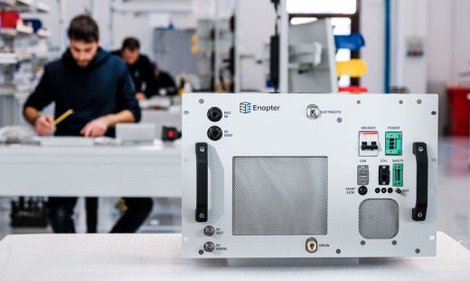Enapter builds mass production facility for electrolyzers in the climate municipality of Saerbeck.
Enapter, the Thai-based specialist for hydrogen technology, is building a mass production plant for electrolyzers for the production of green hydrogen in Saerbeck. The planned "Enapter Campus" in the Münsterland region will be used to create modular systems for the production of green hydrogen using AEM (Anion Exchange Membrane) electrolysis technology. Construction of the factory is set to start in early 2021, with production scheduled to begin in 2022.
Minister of Economic Affairs and Digitization Prof. Dr. Andreas Pinkwart: "The establishment of a new factory for hydrogen electrolyzers with up to 300 jobs shows that North Rhine-Westphalia is making further progress on its way to becoming a hydrogen state. In just a few weeks the state government will be presenting a roadmap to further advance hydrogen technology together with industry. This will enable us to continue to massively reduce CO2 emissions and at the same time enable our companies to remain competitive in the future."
NRW.INVEST supported Enapter in the choice of location. The climate community of Saerbeck prevailed over 100 other locations initially considered by the company throughout Germany.
"As the most important energy region in Europe, North Rhine-Westphalia is driving the energy transition forward with numerous projects. Here Enapter will find an ideal infrastructure to implement its ideas for the efficient use of energy. The company benefits here not only from an innovative research environment, but also from the immediate availability of excellently trained specialists," emphasizes Petra Wassner, CEO of NRW.INVEST.
With the investment in Saerbeck, Enapter is increasing its current production capacity by more than 100,000 modular electrolyzers per year to accelerate the transition from fossil fuels to climate-friendly hydrogen. In addition, the production and operation of the campus will be sustainable, with zero-waste approaches and a facility for the recycling of used electrolyzers.


